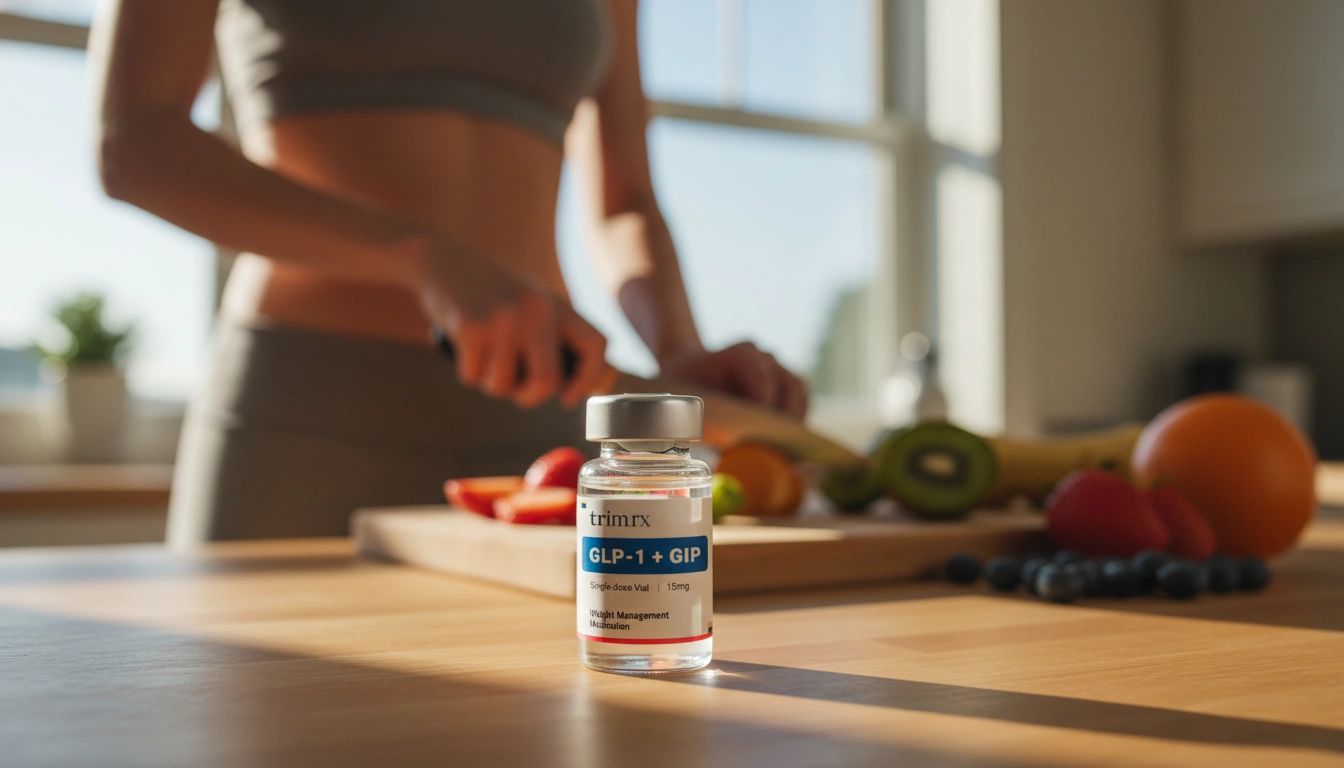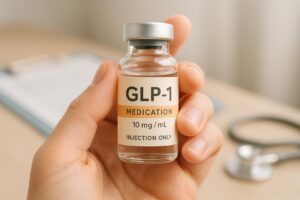Can You Microdose GLP-1 for Weight Loss and Management?

In recent years, the world of weight loss and metabolic health has been revolutionized by a class of medications known as GLP-1 receptor agonists. Drugs like Ozempic, Wegovy, Zepbound, and others have gained significant attention not only for their efficacy in managing weight but also for their ability to influence various metabolic processes. As these medications become more accessible, a novel approach known as microdosing has emerged, raising intriguing questions about dosage flexibility and overall effectiveness. Together, we will explore what microdosing GLP-1 entails, the potential benefits and risks, and how it aligns with our mission at TrimRx to provide personalized weight loss solutions.
Introduction
Did you know that approximately 70% of adults in the United States are overweight or obese? This statistic underscores the urgency of finding effective, sustainable solutions for weight management. As we navigate the complexities of weight loss, particularly in the context of hormonal fluctuations associated with menopause, innovative treatments like GLP-1 medications are becoming pivotal.
GLP-1s work by mimicking a hormone that regulates appetite and insulin secretion, leading to improved satiety and reduced food intake. However, as the popularity of these medications has surged, so has interest in alternative dosing strategies, specifically microdosing. Microdosing involves taking smaller than the standard recommended doses of medication to achieve desired effects while potentially minimizing side effects.
In this blog post, we aim to clarify whether microdosing GLP-1 medications is a viable option for those seeking weight loss and metabolic health. We will delve into the science behind GLP-1s, the rationale for microdosing, and the implications of this approach on weight management. By the end, you will have a comprehensive understanding of this emerging trend and how it might fit into your health journey.
Understanding GLP-1 Medications
What are GLP-1s?
GLP-1, or glucagon-like peptide-1, is a hormone produced in the gut that plays a crucial role in glucose metabolism and appetite regulation. GLP-1 receptor agonists are synthetic versions of this hormone designed to enhance its effects in the body. They have been shown to:
- Reduce Appetite: By increasing feelings of fullness and decreasing hunger.
- Slow Gastric Emptying: Which helps prolong the feeling of satiety after meals.
- Improve Insulin Sensitivity: Leading to better blood sugar control.
Medications such as Ozempic (semaglutide) and Wegovy have garnered FDA approval for weight loss, with studies indicating that individuals can lose significant weight—around 15-20% of their body weight—when combined with lifestyle modifications like diet and exercise.
How Do GLP-1s Work for Weight Loss?
The success of GLP-1 medications in weight management stems from their multifaceted approach to reducing food intake and improving metabolic parameters. Research has demonstrated that these medications can lead to substantial weight loss, particularly when individuals adhere to a healthy lifestyle.
For instance, clinical trials have shown that those taking semaglutide can lose approximately 30 pounds over 68 weeks. This level of weight loss is not just about aesthetics; it can have profound implications for overall health, reducing the risk of chronic diseases such as type 2 diabetes, cardiovascular diseases, and certain cancers.
The Concept of Microdosing
What is Microdosing?
Microdosing refers to the practice of taking a fraction of the standard dosage of a medication. This concept originated with the use of psychedelics but has since expanded into various therapeutic areas, including weight management. When it comes to GLP-1 medications, microdosing means administering less than the manufacturer-recommended dose—often to mitigate side effects while still achieving some benefits.
For example, if the standard dose of semaglutide is 2.4 mg, a microdose might be 0.25 mg or 0.5 mg. The idea is that by using a smaller amount, individuals might still experience weight loss effects while potentially reducing the likelihood of adverse reactions such as nausea or gastrointestinal discomfort.
Why Consider Microdosing GLP-1s?
There are several reasons why individuals might explore microdosing GLP-1 medications:
- Reduced Side Effects: Some patients experience gastrointestinal side effects from standard doses, such as nausea and diarrhea. Microdosing may help minimize these reactions.
- Cost-Effectiveness: GLP-1 medications can be expensive, and microdosing may allow patients to stretch their supply further, making treatment more affordable.
- Personalized Approach: Microdosing allows for more tailored treatment plans. Patients can work closely with their healthcare providers to find the optimal dosage that works for them without going to the maximum recommended amount.
Exploring the Safety and Efficacy of Microdosing
Current Evidence and Research
While anecdotal reports suggest that microdosing GLP-1 medications may be effective for some individuals, scientific research on this approach is still limited. The FDA has not established guidelines for microdosing GLP-1s, and many medical professionals advise caution. The primary concerns include:
- Inadequate Dosing: There is a risk that taking subtherapeutic doses may not provide sufficient benefits, leading to weight regain or inadequate metabolic control.
- Quality Control: Compounded GLP-1 medications, which are often used for microdosing, are not subject to the same rigorous FDA regulations as branded medications, raising concerns about their safety and efficacy.
Expert Opinions
Many healthcare providers express skepticism about microdosing GLP-1 medications. While some patients may find success, it’s crucial to approach this treatment strategy with caution. Experts stress the importance of working closely with a clinician to monitor progress and adjust dosages as needed.
Our commitment at TrimRx is to provide comprehensive support for our patients. We encourage anyone considering microdosing to engage in an open dialogue with their healthcare provider to discuss potential benefits and risks.
Who Might Consider Microdosing GLP-1s?
Microdosing might appeal to various individuals, particularly those who:
- Struggle with Side Effects: If standard doses have led to nausea or other gastrointestinal issues, microdosing under medical supervision may be an option worth exploring.
- Have Financial Constraints: Patients without insurance coverage for GLP-1 medications might find microdosing a more affordable alternative.
- Seek Personalized Solutions: Individuals who want to avoid the “one-size-fits-all” approach of standard dosing may appreciate the flexibility that microdosing offers.
Who Should Avoid Microdosing?
Not everyone is a good candidate for microdosing GLP-1 medications. Those with the following conditions should approach this treatment with caution or avoid it altogether:
- Severe Gastrointestinal Disorders: Individuals with conditions like inflammatory bowel disease or gastroparesis should consult their healthcare provider before considering GLP-1 medications.
- History of Thyroid Cancer: Those with a personal or family history of medullary thyroid carcinoma should avoid these medications due to potential risks.
- Pregnancy or Planning to Conceive: Women who are pregnant or attempting to become pregnant should not take GLP-1 medications.
The Role of TrimRx in Your Weight Loss Journey
At TrimRx, we understand that every individual’s weight loss journey is unique. Our personalized weight loss programs are designed with a focus on safety, efficacy, and support. We offer a comprehensive service that includes:
- Medical Consultations: We provide access to healthcare professionals who can evaluate your health and weight loss goals.
- Personalized Treatment Plans: By completing our free assessment quiz, you can receive a tailored weight loss plan that may include GLP-1 medications.
- Unlimited Support: Our team is here to support you every step of the way, ensuring you have the resources and guidance needed to succeed.
If you’re interested in exploring whether you qualify for our prescription weight loss medications, we encourage you to take our free assessment quiz at TrimRx Quiz.
Additionally, for those looking for quick-access supplements, we offer products like GLP-1 Daily Support and Weight Loss Boost to aid in your weight loss journey.
Conclusion
The concept of microdosing GLP-1 medications presents both opportunities and challenges in the realm of weight management. While there is anecdotal evidence supporting the efficacy of microdosing, more comprehensive research is needed to establish its safety and effectiveness. As we continue to embrace innovative approaches to weight loss, our focus at TrimRx remains on providing personalized, medically supervised care that empowers individuals to achieve their health goals safely.
If you’re considering microdosing or exploring GLP-1 medications as part of your weight loss journey, we encourage you to consult with a healthcare provider who understands your unique needs. Remember, your journey towards better health is a partnership, and together we can navigate the complexities of weight management.
FAQ
Can I lose weight on GLP-1 medications?
Yes, research shows that GLP-1 medications can lead to significant weight loss when combined with a healthy diet and exercise.
Does microdosing GLP-1 medications work?
There is anecdotal evidence suggesting that microdosing may be effective for some, but more research is needed to establish its efficacy compared to standard dosing.
Are GLP-1s safe to take?
GLP-1 medications are generally considered safe by the FDA, but potential side effects do exist. It is essential to discuss any concerns with your healthcare provider.
Who should avoid GLP-1 drugs?
Individuals with severe gastrointestinal conditions, a history of certain types of thyroid cancer, or those who are pregnant should avoid GLP-1 medications.
How can I increase my GLP-1 naturally?
Dietary choices such as consuming high-fiber foods and healthy fats can help stimulate natural GLP-1 production, but medications provide a more significant effect.
By understanding the complexities of GLP-1 medications and the emerging trend of microdosing, we can better navigate the path to effective weight loss and improved metabolic health. At TrimRx, we are dedicated to supporting you in finding the personalized solutions that work best for your journey.

Transforming Lives, One Step at a Time
Keep reading
Tracking Progress With GLP-1: What To Measure
Learn which metrics to track on GLP‑1 therapy—weight, waist, blood sugar, lipids, side effects, and non‑scale wins—and how often to monitor them.
Fatigue Solutions for Ozempic and Wegovy Users
Hydration, protein-rich meals, light activity, and better sleep can reduce medication-related fatigue and help maintain energy during weight-loss treatment.
GLP-1 Medication Side Effect Checker
Worried about GLP-1 medication side effects? Use our free checker for Semaglutide, Liraglutide, and more to learn what to expect and stay informed!



